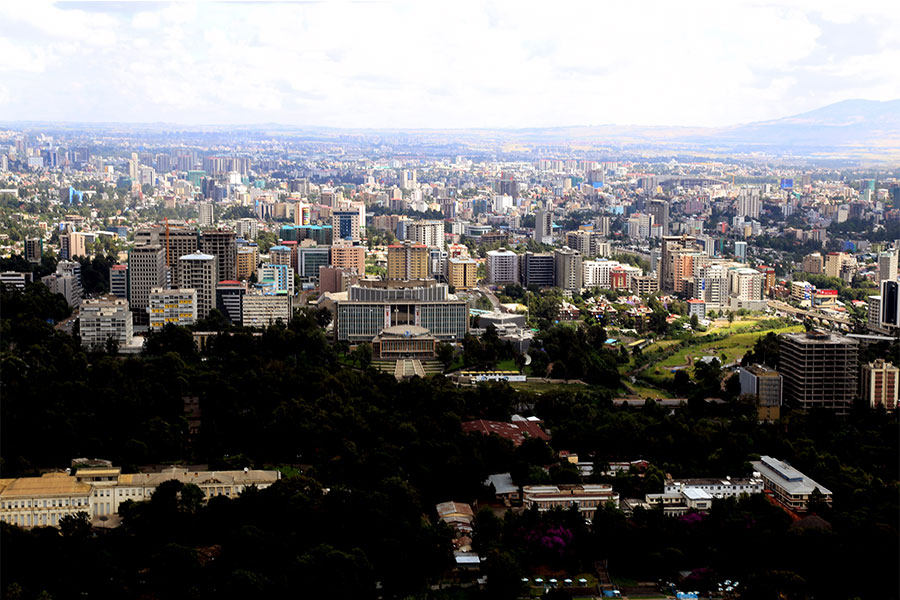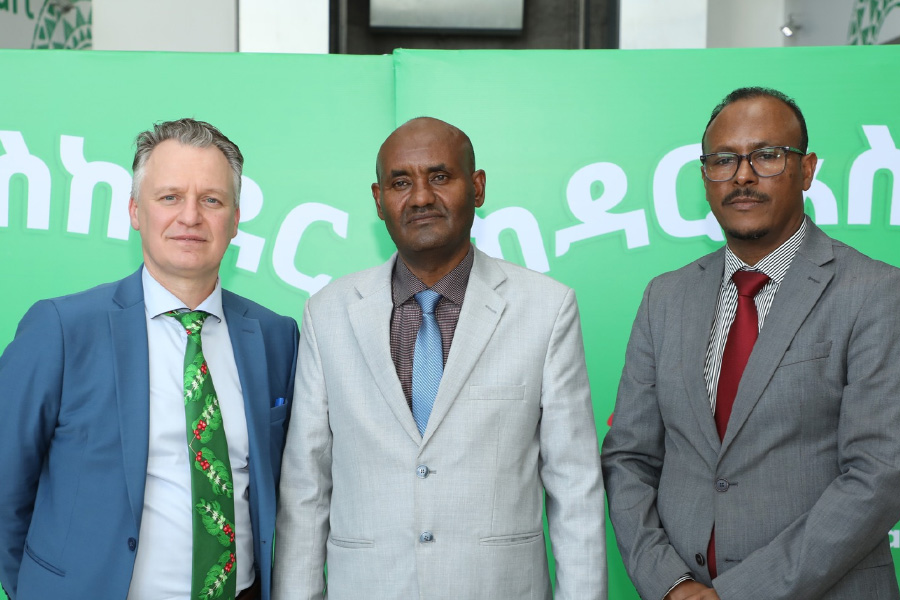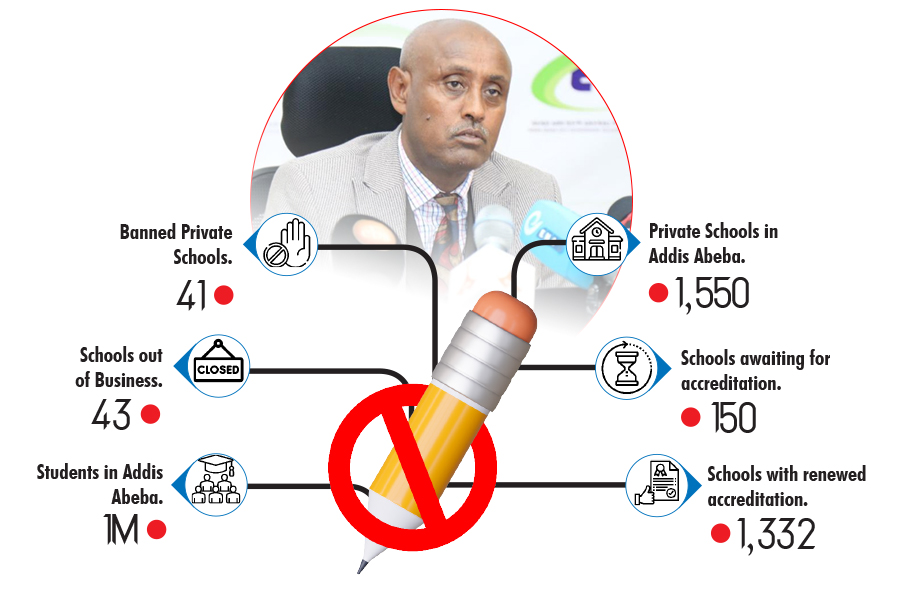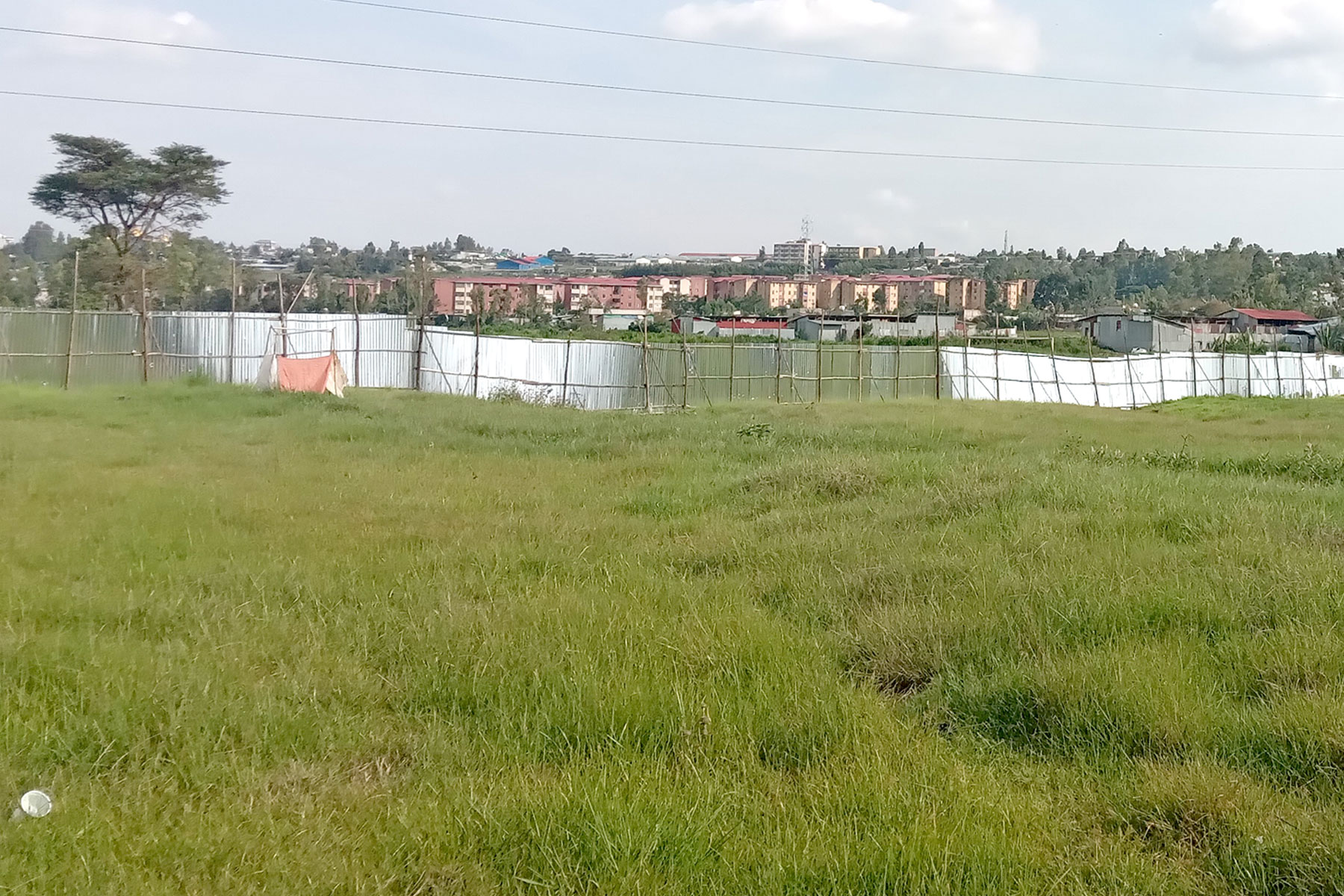
Agenda | Apr 26,2019
Jun 4 , 2022
By Antensay Tafesse
Private businesses should not be left unbridled when behaving recklessly or harming the public interest. However, like any other business, in the face of unfavourable macro-economic realities, it is hard to fathom why private schools are repeatedly singled out and left out in the cold, writes Antensay Tafesse, who has been running a private school in Addis Abeba for over two decades.
Over the last few decades, private schools have been mushrooming in the country, especially in Addis Abeba, to meet the ever burgeoning demand for quality education from parents who are willing and capable to pay. Ever since their debut in the mid-1990s, these schools have shown incredible progress in terms of attracting huge student populations and providing better quality education.
The Education Sector Strategy of 1994, which calls on private sector investment in education, has enticed many investors into the sector. These investments have certainly helped the government re-direct some of its scarce resources to other sectors, which otherwise would have been invested in the expansion of public schools. These private schools are also contributing greatly in producing competent, efficient, knowledgeable and innovative citizens. The tens of thousands of employment opportunities these schools have created, and their contributions to government revenues in the form of taxes are also significant. Private schools have proven themselves to be strong strategic partners to the government.
The expansion of private schools in Addis Abeba has also created new opportunities for many parents to educate their children in a safer, better organised and more engaging learning environment. Albeit their shortcomings, parents still prefer private schools over public ones.
Why are parents sending their children to private schools while they can get free education in public schools?
Parents, as consumers, are rational and sovereign in their economic choices that best promote their self-interests. They flock to private schools in the tens of thousands simply because public schools have failed to fulfil their needs and expectations.
Learning in private schools in Ethiopia leads to better academic achievements than in public schools. Better access to improved classrooms, attractive work environment, sufficient facilities, more qualified teachers, enriched curricula and a school management system focused on learning results is provided in private schools. Using value-added models of learning achievement, there is a substantial and statistically significant private school premium validating the fact that the better academic performance of children in private schools in Ethiopia is due to school type. If they are given due attention, such data can provide a useful guide for policy.
In fact, to survive and thrive, private schools constantly advance and maintain the quality of education they provide by investing in facilities, educational inputs, technologies, and by hiring and retaining better teachers. Their educational organisation also focuses on robust instructional leadership and supervision, advancement of purposeful teaching, promotion of strong student discipline, setting high expectations, creating home-school partnerships and of course, cost efficiency. These are the best practices public schools need to emulate but grossly failed to do over the years, even as taxpayers pumped money into their coffers.
Regardless of all their merits, private school investors are becoming increasingly nervous and are frustrated with the lack of support and partnership from the government. For long, they have been at the centre of media scourge, portrayed as rapacious and profiteers. Though there could be some private schools out there which are unruly and unscrupulous, tarnishing the reputation and dwarfing the subsequent contributions of these schools, in general, is not helpful or constructive for the ongoing debate. The fact that they are subjected to stringent and stifling regulatory oversight is also a serious concern for many who run these schools.
The notion held by some that private schools are independent and can autonomously decide on varieties of instructional and administrative issues is misleading. When opening or running a private school, 632 indicators under 35 standards are employed to assess a school’s adherence to standards related to curriculum, facilities, educational inputs, human resource requirements, operational and organisational issues, and campus and class sizes. In addition, rigorous inspections are conducted periodically to assess inputs, processes and outcomes in each private school to determine license renewal and to rate the standard of each school. However, these set of rules and regulations mainly target private schools turning a blind eye to public ones where they are most needed.
Since 2015, the Addis Abeba City Administration has expanded its regulatory regime to control fees of private schools. It is probably the only private service sector put under government price regulation in the country. What makes the government’s directive ludicrous and insidious is that schools have to present reasons for their fee increment for parents’ approval. It is only when parents agree they are willing to pay that the price adjustment can take effect. In many instances, these school-parent meetings on this issue were discordant, chaotic and full of wrangling which blemished the relationship between parents and schools.
Even worse, the city's Education & Training Quality Control Authority recently issued a directive stating that private schools cannot make fee adjustments for the 2022/23 academic year. The Authority had also banned school fee increases for the 2019/20 academic year owing to COVID-19. This pattern of banning school fee adjustments is a blatant violation of the country’s laws and accepted principles of the free market system the nation claims to have adopted, and if unchallenged, will create precedence for other industries. As a matter of fact, the crushing hand of the ever rising inflation and the impact of COVID-19 have already weakened many private schools. Taking into account the existing macro-economic environment, banning fee adjustments for the second time in three years is outlandish and could, in effect, be the last straw.
This unreasonable move of the regulatory agency to ban a reasonable and legitimate fee adjustment will push private schools to the precipice. Shortage of funds in these schools will force them to cut costs. Well-qualified and able teachers and instructional leaders will flock to other industries looking for better pay; and those who stay will be unmotivated and inefficient. In addition, shortage of funds to fulfil educational inputs will have direct impact on the quality of education these schools provide. This unintended outcome of the government’s interference will ultimately sabotage the long-term interest of parents and the state.
The Addis Abeba Private Schools Employers’ Association is adamant that the Authority is functioning outside of its jurisdiction. It asserts that the Authority is entrusted by law with the task of quality assurance of education and licensing issues, not school fee regulation. The Association is now preparing to take the case to court in an effort to reverse the decision which many consider a fait accompli.
As education is a public good, it should be accepted that the state has a responsibility over the regulatory framework within which education is provided. When it comes to private schools, the state’s regulatory oversight, however, should mainly focus on performance, monitoring and quality maintenance. If the government must regulate school fees, it needs to put in place the right legal framework which is in congruence with the country’s laws. The rich experiences of countries like Kenya, Nigeria, Uganda, UAE and India could be illuminating. These countries have adopted a variety of systems to regulate fee adjustments in private schools, like setting up committees and agencies for this specific task or adopting a formula for increment as in the case of Nigeria.
As public schools are dragging behind in fulfilling the public’s demand for quality education, parents see no option but to send their children to private schools, paying hefty amounts which they could have otherwise spent on other household needs. For over three decades, as private schools thrive and excel, their public counterparts, in the hands of policymakers and executives, have made little or no qualitative progress in the education they deliver, although the school feeding programme for half a million students in Addis Ababa’s public schools is a commendable job.
It is becoming apparent that “classes” of students are created according to their socio-economic backgrounds which lead to unequal educational opportunities and outcomes, not to mention social cohesion in the society, which is severely undermined. Students who attend private schools take a great deal of advantage over their counterparts in public schools. They have competitive advantage to out-perform them in national exams, in higher education and later on in their lives. This privilege by birth raises a question of social justice and equity as it inhibits the less fortunate ones from achieving their aspirations. It also hinders their upward social mobility. Pundits close to the sector argue that this should have been the major concern of the government rather than suffocating private schools, and scapegoating them for its failed policies in public schools.
Unless these public schools revamp their standards and become options for middle-income households and for families with fixed incomes, the government’s current approach is nothing but chasing the wild goose. It is now time to have a public debate on how we can improve the standards of public schools where the taxpayers’ money is not grossly mismanaged and inefficiently spent. Families who are struggling to make ends meet mainly due to ever rising inflation should have the opportunity to get universal education with a modest standard that guarantees their children a decent life in their future.
Cynically, policy makers, education regulators, social justice advocators, opinion makers and professionals send their children to private schools. It is likely that, related to school fees, these people in power and influence promote their personal interests in the guise of public policy. Sadly, not only will their injudicious disposition fetter the growth of the nascent private school industry, but also casts a shadow on the integrity of public policies.
Price control stymies entrepreneurial motivation, and hinders competition as it causes entry barriers. It also denies businesses the freedom and capability to maintain the quality of their products or services. As with any other business venture, it is no secret that investment in private schools aims at positive returns on investment. The fact that private schools are singled out for price regulation is a double standard in the first place. These schools should be allowed to have the liberty, within the legal framework of the country, to make their own sovereign business decisions, like private health institutions for instance, so that they can survive in these challenging times. In an utopian world, they should have been supported in a way of tax breaks, provision of low-interest loans or direct government subsidies as opposed to pushing them to the edge of the cliff with hostile policies.
No one is here to argue that private businesses, including private schools, should be left unbridled when behaving recklessly or harming public interest. However, like any other business, in the face of unfavourable macro-economic realities these schools are grappling with, it is hard to fathom the rationale why they are repeatedly singled out and left out in the cold. The decision to ban school fee adjustments in private schools back-to-back is simply unfair, unjustifiable, short sighted, illegal and unconstitutional.
PUBLISHED ON
Jun 04,2022 [ VOL
23 , NO
1153]


Agenda | Apr 26,2019

Radar | Nov 24,2024

Agenda | Feb 02,2019

Sunday with Eden | Feb 29,2020

Fortune News | Jun 22,2024

Fortune News | Dec 01,2024


Radar | May 08,2021

Commentaries | Jan 19,2024

Fortune News | Dec 04,2022

Photo Gallery | 180953 Views | May 06,2019

Photo Gallery | 171145 Views | Apr 26,2019

Photo Gallery | 162286 Views | Oct 06,2021

My Opinion | 137339 Views | Aug 14,2021

Dec 22 , 2024 . By TIZITA SHEWAFERAW
Charged with transforming colossal state-owned enterprises into modern and competitiv...

Aug 18 , 2024 . By AKSAH ITALO
Although predictable Yonas Zerihun's job in the ride-hailing service is not immune to...

Jul 28 , 2024 . By TIZITA SHEWAFERAW
Unhabitual, perhaps too many, Samuel Gebreyohannes, 38, used to occasionally enjoy a couple of beers at breakfast. However, he recently swit...

Jul 13 , 2024 . By AKSAH ITALO
Investors who rely on tractors, trucks, and field vehicles for commuting, transporting commodities, and f...

Nov 1 , 2025
The National Bank of Ethiopia (NBE) issued a statement two weeks ago that appeared to...

Oct 25 , 2025
The regulatory machinery is on overdrive. In only two years, no fewer than 35 new pro...

Oct 18 , 2025
The political establishment, notably the ruling party and its top brass, has become p...

Oct 11 , 2025
Ladislas Farago, a roving Associated Press (AP) correspondent, arrived in Ethiopia in...

Nov 2 , 2025
The National Bank of Ethiopia (NBE) has scrapped the credit-growth ceiling that had s...

Nov 2 , 2025 . By SURAFEL MULUGETA
The burgeoning data mining industry is struggling with mounting concerns following th...

Nov 2 , 2025 . By YITBAREK GETACHEW
Berhan Bank has chosen a different route in its pursuit of a new headquarters, opting for a transitional building instea...

Nov 2 , 2025 . By BEZAWIT HULUAGER
Nib International Bank S.C. has found itself at the epicentre of a severe governance...